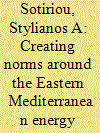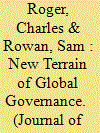|
|
|
Sort Order |
|
|
|
Items / Page
|
|
|
|
|
|
|
| Srl | Item |
| 1 |
ID:
171719


|
|
|
|
|
| Summary/Abstract |
The energy discoveries in the Eastern Mediterranean since the 2000s have placed the long-standing rivalry between Turkey and Cyprus (and by extension Greece) in a new context, bringing also Egypt and Israel into the geopolitical equation. Turkey, on the one hand, has adopted an assertive profile, whereas, on the other hand, two axes of cooperation have been formed, Greece-Cyprus-Egypt and Greece-Cyprus-Israel, convening trilateral summits and signing agreements. In view of that, it is currently upheld that the confluence of energy interests among the actors of the trilateral summits has facilitated a legalisation throughout the Eastern Mediterranean, propelling states towards the development of the energy resources according to the UNCLOS, and the implementation of the international law in the Cyprus problem, as a necessary means of guaranteeing the actors’ sovereignty, creating norms, and enhancing security, without targeting any third country. The argument shows how legalisation, as a special form of institutionalisation, and soft law, in particular, nurture regional cooperation and place it under the “protective wings” of international institutions.
|
|
|
|
|
|
|
|
|
|
|
|
|
|
|
|
| 2 |
ID:
140878


|
|
|
|
|
| Summary/Abstract |
Since 1997, the International Monetary Fund's (IMF) role in surveillance of member countries has changed dramatically. Surveillance, as mandated in Article IV of the Articles of Agreement, has moved from a private process to a public one, with documentation from the consultation freely available at the Fund's Website. But does this public process of surveillance make a difference in generating policy debates? To answer this question, we evaluate whether the Fund's Article IV review was referenced on Capitol Hill and by the White House during two consecutive reviews in the summers of 2010 and 2011. Given the debate about the debt ceiling, the summer of 2011 is a most likely case for the Fund's advice to enter into the policy process. There is little evidence that findings from these reports percolated into the public sphere, casting doubt on the effectiveness of IMF surveillance in developed countries.
|
|
|
|
|
|
|
|
|
|
|
|
|
|
|
|
| 3 |
ID:
193109


|
|
|
|
|
| Summary/Abstract |
We present a new dataset of membership in informal international organizations—IOs founded with non-binding instruments—which constitute one-third of operating IOs. We introduce state-IO-year–level membership data for 195 countries that complements the dataset on formal IOs from the Correlates of War Project. We explain our conceptualization of an informal IO, contrast it with other approaches, and detail the data collection process. We illustrate similarities and differences across formal and informal IOs, and across states and regions. We explain how our data validate or challenge conjectures about informal cooperation that have been inaccessible for lack of data. We demonstrate that while formal and informal IOs are similar in size, the composition of informal memberships in informal IOs is more fragmented. While informal IOs are a growing part of the governance portfolios of most states, some countries and regions participate more. We conclude by outlining elements of the research program our dataset unlocks.
|
|
|
|
|
|
|
|
|
|
|
|
|
|
|
|
| 4 |
ID:
178204


|
|
|
|
|
| Summary/Abstract |
One of the most debated and criticized characteristics of the Global Compact for Safe, Orderly and Regular Migration (GCM) is its legally non-binding form. This article analyzes the GCM’s legal form, mechanisms of effectiveness, and legitimacy and finds that while the legal form of the GCM is important, the available mechanisms of effectiveness and legitimacy are equally or, perhaps, more important factors to determine the compact’s relevance and future impact. Although non-binding, the GCM does possess the relevance, capacities, and legitimacy to become a normative force in the field of international migration governance. Compliance with its outlined commitments will, however, be strongly dependent on the political will of the participating states. Perhaps its key function will be to fill the existing gaps in hard law in global migration governance by fostering cooperation and consolidating international obligations, standards, and stakeholders of a crosscutting topic into one instrument.
|
|
|
|
|
|
|
|
|
|
|
|
|
|
|
|
| 5 |
ID:
097841


|
|
|
|
|
| Publication |
2010.
|
| Summary/Abstract |
This paper analyzes and assesses the "Principles for Stable Capital Flows and Fair Debt Restructuring in Emerging Markets," which have emerged as an important instrument for crisis prevention and crisis resolution in the international financial system. The paper argues that, notwithstanding their low profile, the Principles which were jointly agreed between key sovereign debtors and their private creditors in 2004 have proved to be a useful instrument in spite of their voluntary and non-binding nature. Indeed, an increasing number of sovereign debtors and private creditors have adopted the Principles' recommendations on transparency and the timely flow of information, close dialogue, "good faith" actions, and fair treatment. The paper, taking a rational choice perspective, appraises the Principles as the product of a transnational public-private partnership as well as a soft mode of governance. Moreover, it shows how the Principles have moved somewhat along the continuum of soft law and hard law toward the latter. Finally, the paper makes the case that the Principles and their design features can provide some lessons for the current international policy debate on codes of conduct in global financial regulation.
|
|
|
|
|
|
|
|
|
|
|
|
|
|
|
|
|
|
|
|
|